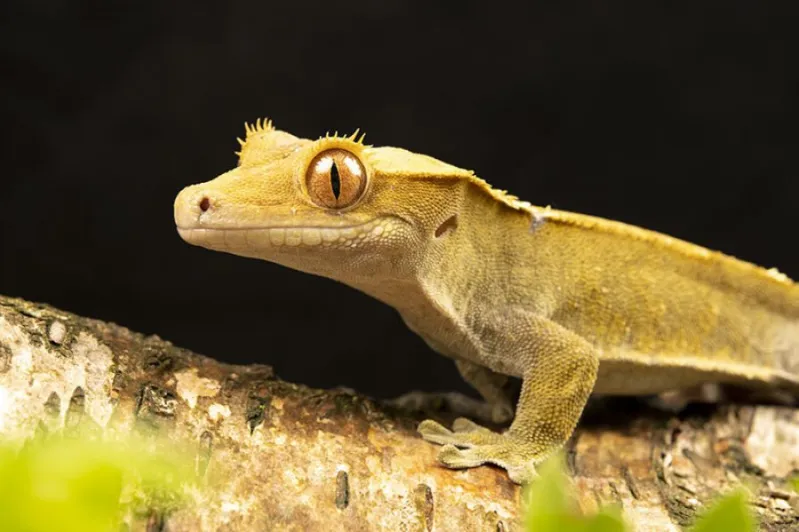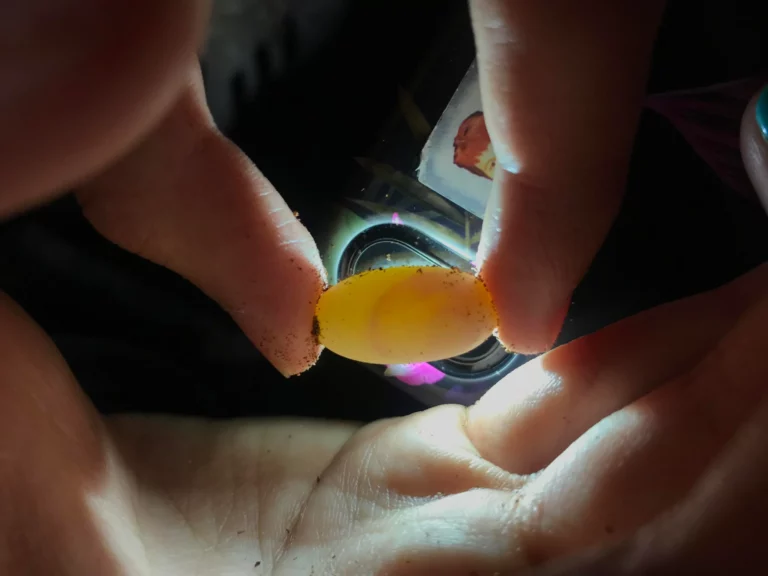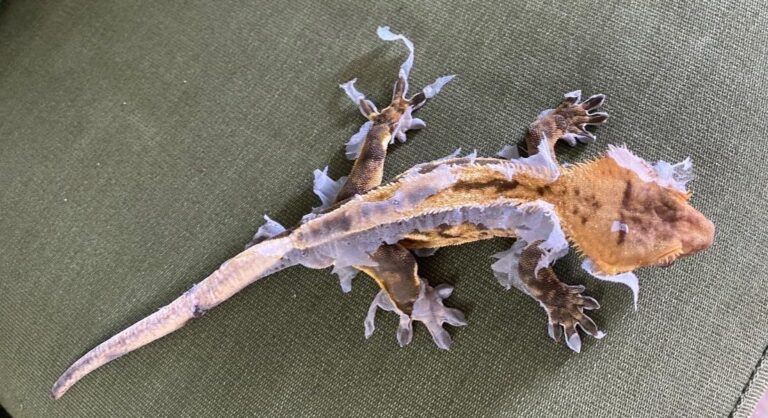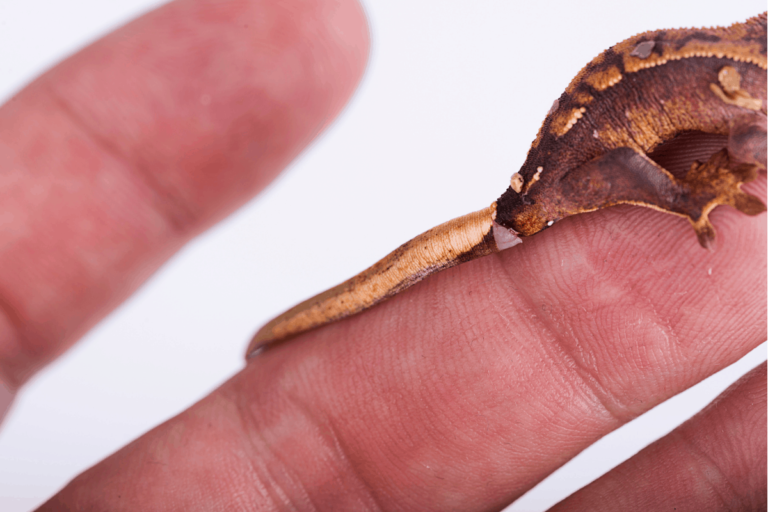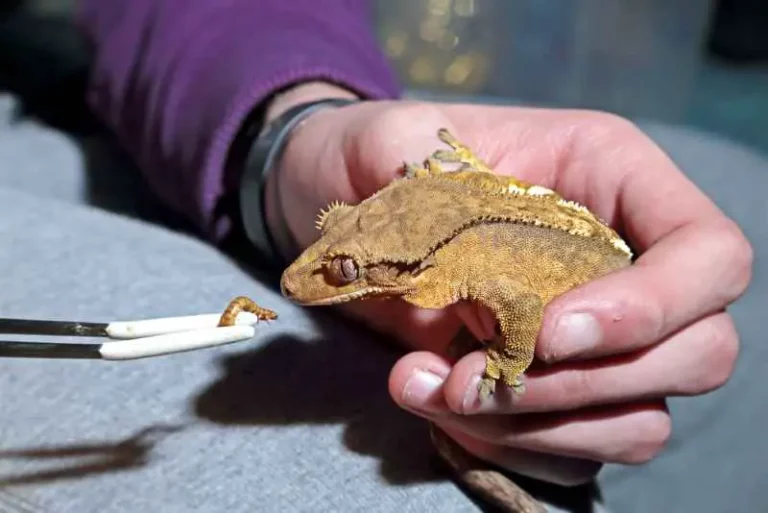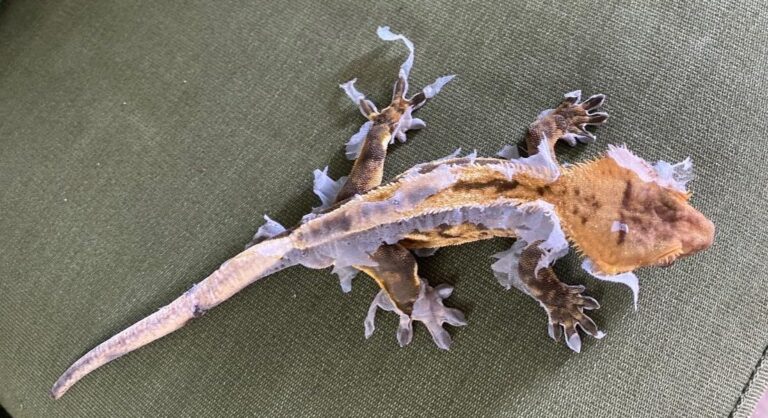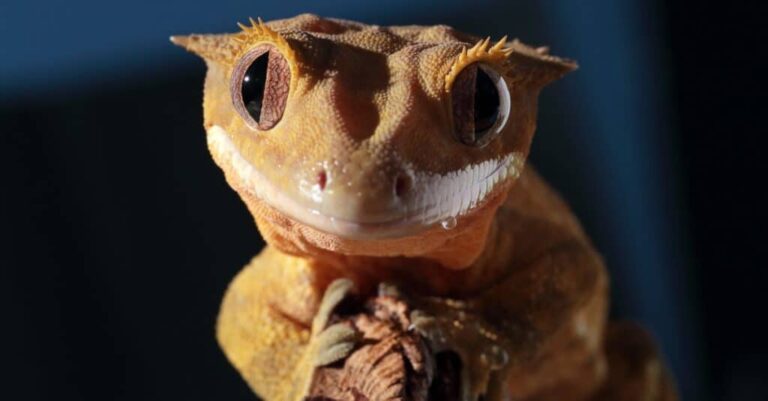Unlocking The Secrets Of How Long Crested Geckos Live
As I gazed into the glass enclosure of my crested gecko, Spike, I couldn’t help but wonder about the fascinating mysteries surrounding these enchanting creatures. Their vibrant colors, distinctive crests, and peculiar personalities have captivated me since I first brought Spike home. However, one question lingered in my mind like a persistent whisper: How long do crested geckos live?
At first, it seemed like a straightforward question. But as I dug deeper, I realized that there was no easy answer. Different folks had different stories about their geckos’ lifespans, leaving me puzzled.
In the end, I found out the average answer, 10-15 years is the typical captivity lifespan.
So, I decided to embark on a journey of discovery. Join me to uncover more secrets of their lifespans.
Gender and Reproductive Health:
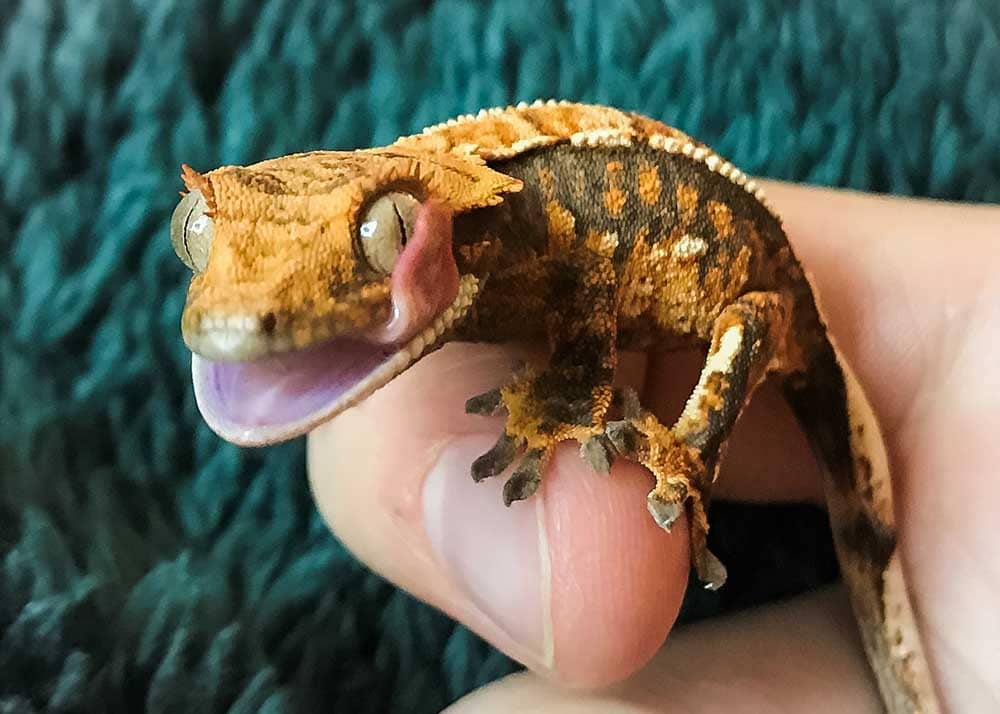
Female crested geckos, like many female reptiles, generally experience shorter lifespans compared to males due to the demands of breeding and egg production. Breeding places significant strain on their nutritional resources and carries the risk of emergency health issues such as calcium deficiency, prolapsed cloaca, and egg binding. Even if breeding is not your intention, female geckos may lay infertile eggs, which can still lead to health complications.
Interestingly, these breeding-related problems are more common in captivity than in the wild. The reasons for this disparity remain unclear, but factors like improper care and rapid growth are likely contributors. To minimize the risk of reproductive issues, consider selecting a male juvenile or sub-adult if you do not plan to breed crested geckos.
Enclosure Size and Setup:
Proper husbandry plays a pivotal role in the health and lifespan of crested geckos. Inadequate care and, specifically, providing insufficient enclosure space can result in various health problems that can shorten your pet’s life.
One common mistake among new crested gecko owners is housing them in cramped enclosures. It’s essential to understand that the size of the enclosure should not be solely determined by the gecko’s small stature. Being semi-arboreal creatures, crested geckos require ample space to move around comfortably. A minimum of a 20-gallon tank, along with plenty of decorations that create climbing and hiding opportunities, is essential. This setup minimizes stress, ensuring your gecko feels secure and at ease.
Diet:
The food your crested gecko eats is super important for how long it lives in captivity. But don’t worry, you can easily give your gecko the right food it needs without breaking the bank.
In the wild, crested geckos munch on insects, fruit, and pollen. For your pet gecko, you have choices. You can use a special food like Repashy, which has all the good stuff they need. Or, you can get hands-on and feed them a mix of soft fruits and insects like bananas.
If you go the fruit and insect route, don’t forget to add calcium powder to the insects. This stops a common health problem called metabolic bone disease.
Taking care of your gecko’s diet isn’t just about keeping it happy. It’s the key to helping your gecko live a longer, healthier life.
Health Problems:
Metabolic Bone Disease (MBD): MBD is a serious condition caused by a lack of calcium in your gecko’s diet. It can lead to weakened bones, deformities, and even paralysis. To prevent MBD, ensure your gecko receives adequate calcium through supplementation and a balanced diet.
Parasitic Infections: These unwelcome guests can harm your gecko’s digestive system and overall health. Regularly monitor for signs of parasitic infection, such as changes in feces or behavior. A vet can provide deworming treatment if necessary.
Stuck Shed (Dysecdysis): Shedding is a natural process for crested geckos, but sometimes they struggle to shed properly, resulting in stuck skin. Inadequate humidity or improper enclosure conditions can contribute to this issue. Maintain optimal humidity levels and provide a shedding box to help your gecko shed their skin effortlessly.
Bacterial and Respiratory Infections: These infections can lead to severe health issues if left untreated. Watch out for signs like loss of appetite, diarrhea, lethargy, and dehydration. If you notice any of these symptoms or any unusual behavior, consult an exotics veterinarian promptly.
Temperature:
Crested geckos thrive in temperatures that are slightly warmer than room temperature. During the day, maintain a range of 72 to 78 degrees Fahrenheit (22-26 degrees Celsius) inside their enclosure. However, at night, allow the temperature to drop slightly, ranging from 69 to 74 degrees Fahrenheit (20-23 degrees Celsius).
Extreme temperatures, exceeding 85 degrees Fahrenheit (29 degrees Celsius), can cause stress, dehydration, and even heatstroke in your gecko. Conversely, consistently low temperatures below 65 degrees Fahrenheit (18 degrees Celsius) can lead to reduced appetite and lethargy.
Humidity:
Maintaining the right humidity levels is vital for the well-being of crested geckos. Aim for a humidity range of 70% to 80% within the enclosure. Achieve this by misting your gecko’s tank two to three times a day using a squirt bottle or by utilizing an automatic misting system.
However, it’s essential to strike a balance. Excessively high humidity levels over time can potentially lead to respiratory issues. On the flip side, insufficient humidity can result in dehydration and difficulties with shedding.
Environmental Factors and Genetics: Crested geckos’ lifespan can be influenced by various factors. Extreme weather conditions, like prolonged droughts or intense heat, can have a notable impact on their longevity.
Additionally, genetics, inherent to all living creatures, also contribute to determining the natural lifespan of crested geckos in the wild. Some individuals may naturally live shorter or longer lives than the average. To ensure the well-being of captive crested geckos, it’s crucial to provide a controlled and suitable environment, while acknowledging the role of genetics in their overall lifespan.
Minimizing Stress:
Ensuring the longevity of captive crested geckos involves steering clear of stressful situations. This includes avoiding excessive handling or improper methods of interaction with your gecko.
Quick overview of Crested geckos:
This table provides a quick overview of key information about crested geckos.
| Common Name | Crested Gecko |
| Scientific Name | Correlophus ciliatus |
| Family | Diplodactylidae |
| Range | Island rainforests of New Caledonia |
| Size | 8 to 10 inches |
| Color | 3 wild color morphs (tiger, patternless, and white-fringed) |
| Lifespan | 20 years |
| Husbandry | Simple |
| Diet | Insects and fruit |
| Tank Size | 30 to 50 gallons |
| Temperature | 75°F |
| Humidity | 60 to 70% |
| Price | $50 to $150 |
This table provides a quick overview of key information about crested geckos.
Tips for Extending a Crested Gecko’s Lifespan?
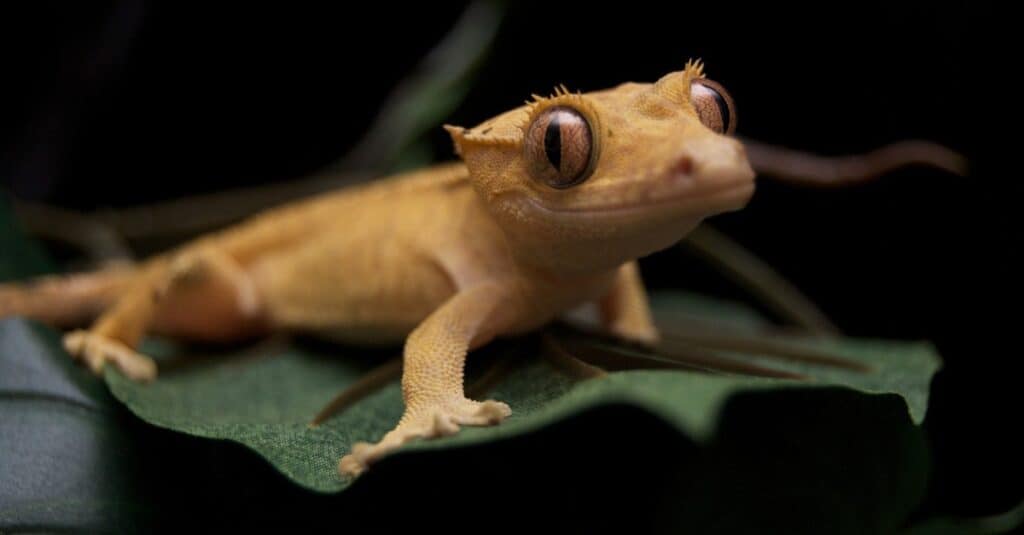
Provide a Proper Habitat:
Offer an adequately sized enclosure with plenty of vertical space for climbing and hiding. A 20-gallon tank or larger is suitable for a single crested gecko.
Include branches, plants, and other decorations to create a stimulating and enriching environment.
Ensure secure ventilation and maintain appropriate temperature and humidity levels.
Maintain Ideal Temperature and Humidity:
Keep the daytime temperature between 72 to 78 degrees Fahrenheit (22-26 degrees Celsius) and nighttime temperatures between 69 to 74 degrees Fahrenheit (20-23 degrees Celsius).
Maintain humidity levels between 70% to 80% by misting the enclosure regularly or using an automatic misting system.
Use a hygrometer and thermometer to monitor conditions.
Dietary Care:
Feed your crested gecko a balanced diet, including commercial crested gecko food, as well as occasional live insects and soft fruits like bananas.
Dust feeder insects with calcium powder before offering them to prevent metabolic bone disease.
Avoid Overfeeding:
Avoid overfeeding to prevent obesity and related health issues.
Provide food appropriate to the gecko’s size and age.
Gender Considerations:
If you do not plan to breed crested geckos, consider choosing a male juvenile or sub-adult, as females can experience reproductive-related health problems.
Regular Health Monitoring:
Keep a watchful eye on your gecko’s behavior and appearance.
Schedule yearly veterinary check-ups to detect and address any health concerns.
Handling with Care:
Minimize handling to reduce stress. Crested geckos are generally not fond of frequent handling.
When you do handle them, do so gently and avoid sudden movements.
Clean and Maintain the Enclosure:
Regularly clean the enclosure to remove waste and maintain cleanliness.
Replace substrate and clean decorations as needed.
Provide a Shedding Box:
Offer a shedding box filled with damp moss or paper towels to aid in the shedding process.
Quarantine New Geckos:
Quarantine any new geckos before introducing them to your existing collection to prevent the spread of diseases.
Educate Yourself:
Stay informed about crested gecko care by reading books, articles, and participating in online forums to learn from experienced keepers.
FAQs
What Factors Affect Wild Crested Geckos’ Lifespans?
In the wild, factors like predation, habitat conditions, and access to food and water influence their lifespans.
What Factors Affect Captive/Pet Crested Geckos’ Lifespans?
In captivity, factors include proper habitat setup, diet, avoiding stress, and veterinary care.
Why Crested Geckos Make Good Pets?
Crested geckos make excellent pets due to their manageable size, low maintenance, and unique appearance. They are also docile and don’t require much handling.
What Do Crested Geckos Drink?
Crested geckos primarily drink water, which can be provided through misting their enclosure or offering a shallow water dish.
How Do I Play with a Crested Gecko?
While crested geckos don’t play like mammals, you can observe and interact with them calmly in their enclosure. Avoid excessive handling to reduce stress.
How Old Is The Oldest Crested Gecko?
The oldest recorded crested gecko lived for approximately 22 years, though lifespans of 15-20 years are more common in captivity with proper care.
Final words
In my exploration of crested geckos, I’ve discovered that these remarkable creatures have the potential to live for an impressive 20 years or even more when they receive the care and environment they deserve. It’s truly fascinating to witness these reptiles thrive for such an extended period.
What stands out is that by providing the right conditions, including a suitable habitat, a balanced diet, and a stress-free environment, we, as their caretakers, can play a pivotal role in ensuring their health and longevity. Crested geckos have proven to be not just captivating pets but also long-term companions, offering us the joy of their company for two decades or more. It’s a remarkable journey of discovery and companionship that I’m eager to embark on with these unique reptiles.

